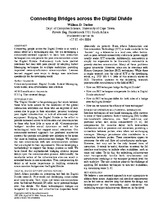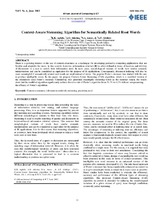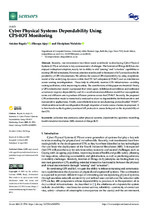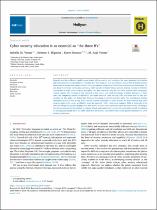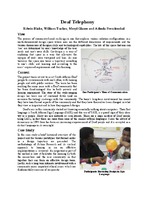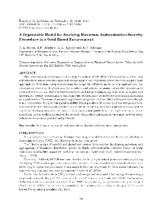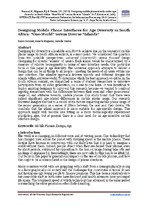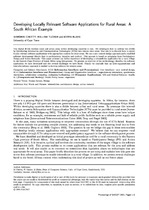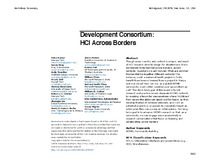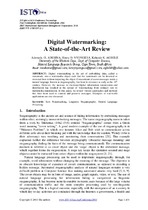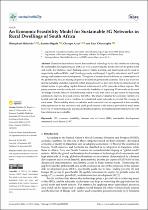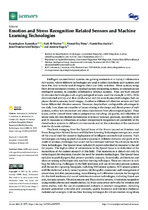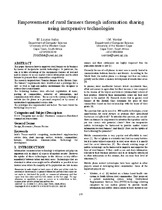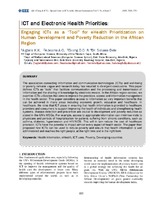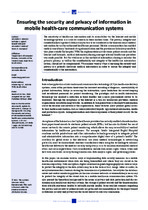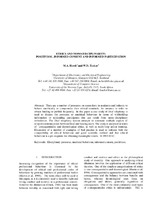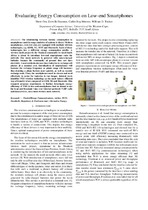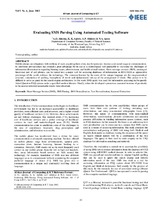Browsing Computer Science by Title
Now showing items 35-54 of 171
-
Connecting bridges across the digital divide
(ACM, 2004)Connecting people across the Digital Divide is as much a social effort as a technological one. We are developing a community-centered approach to learn how interaction techniques can compensate for poor communication across ... -
Context-Aware Stemming algorithm for semantically related root words
(Institute of Electrical and Electronics Engineers (IEEE) Inc., 2012)There is a growing interest in the use of context-awareness as a technique for developing pervasive computing applications that are flexible and adaptable for users. In this context, however, information retrieval (IR) is ... -
Cyber physical systems dependability using cps-iot monitoring
(MPDI, 2021)Recently, vast investments have been made worldwide in developing Cyber-Physical Systems (CPS) as solutions to key socio-economic challenges. The Internet-of-Things (IoT) has also enjoyed widespread adoption, mostly for ... -
Cyber security education is as essential as “the three R's”
(CELLPRESS, 2019)Smartphones have diffused rapidly across South African society and constitute the most dominant information and communication technologies in everyday use. That being so, it is important to ensure that all South Africans know ... -
Deaf telephony: community-based co-design
(Wiley, 2011)The process of community-based co-design is one that explores various solution configurations in a multi-dimensional design space whose axes are the different dimensions of requirements and the various dimensions of designer ... -
Deaf telephony: community-based co-design (case study)
(Wiley, 2011)The process of community-based co-design is one that explores various solution configurations in a multi-dimensional design space whose axes are the different dimensions of requirements and the various dimensions of designer ... -
A dependable model for attaining maximum authetication security procedure in a grid based environment
(Academic Journals Inc., 2012)Grid computing is an emergent computing innovation which offers endless access to computing infrastructure across various organizations (academia and industry). Since this technology allows aggregation of various computer ... -
Designing mobile phone interfaces for age diversity in South Africa: “One-World” versus diverse “Islands”
(Springer, 2013)Designing for diversity is a laudable aim. How to achieve this, in the context of mobile phone usage by South African seniors, is a moot point. We considered this question from two possible perspectives: universal ... -
Developing locally relevant applications for rural areas: a South African example
(SAICSIT, in assocation with ACM, 2004)The digital divide between rural and urban areas within developing countries is vast. We investigate how to address this divide by introducing Information and Communication Technologies (ICTs) into remote rural areas. Our ... -
Development consortium: HCI across borders
(Association for Computing Machinery, 2016)Though every country and context is unique, and much of HCI research aims to design for situatedness, there are lessons to be learned across borders, across contexts. Questions we ask include: What are common themes ... -
Digital watermarking: a state-of-the-art review
(IIMC International Information Management Corporation, 2010)Digital watermarking is the art of embedding data, called a watermark, into a multimedia object such that the watermark can be detected or extracted later without impairing the object. Concealment of secret messages inside ... -
An economic feasibility model for sustainable 5G networks in rural dwellings of South Africa
(MDPI, 2022)Numerous factors have shown Internet-based technology to be a key enabler in achieving the sustainable development goals (SDG), as well as narrowing the divide between the global north and south. For instance, smart ... -
Emotion and stress recognition related sensors and machine learning technologies
(MPDI, 2021)Intelligent sociotechnical systems are gaining momentum in today’s informationrich society, where different technologies are used to collect data from such systems and mine this data to make useful insights about our ... -
Empowerment of rural farmers through information sharing using inexpensive technologies
(ACM, 2011)This paper discusses how to empower rural farmers to do business by means of inexpensive mobile technologies. In particular, the aim is to take advantage of the inexpensive features of low-end mobile phones to access market ... -
Engaging ICTs as a “Tool” for eHealth prioritization on human development and poverty reduction in the African region
(Institute of Electrical and Electronics Engineers (IEEE) Inc., 2011)The association connecting information and communication technologies (ICTs) and well-being or poverty remains vague and research today has resulted to divergent conclusions. This paper defines ICTs as “tools” that facilitate ... -
Ensuring the security and privacy of information in mobile health-care communication systems
(Academy of Science of South Africa, 2011)The sensitivity of health-care information and its accessibility via the Internet and mobile technology systems is a cause for concern in these modern times. The privacy, integrity and confidentiality of a patient’s data ... -
Ethics and mono-disciplinarity: positivism, informed consent and informed participation
(Elsevier, 2005)There are a number of pressures on researchers in academia and industry to behave unethically or compromise their ethical standards, for instance in order to obtain funding or publish frequently. In this paper a case study ... -
Evaluating energy consumption on low-end smartphones
(2015)The relationship between battery consumption in smartphones and the usage statistics of a phone is direct. Modern smartphones, even low-end, are equipped with multiple wireless technologies, e.g. GSM, 3G, WiFi and ... -
Evaluating SMS parsing using automated testing software
(Institute of Electrical and Electronics Engineers (IEEE) Inc., 2012)Mobile phones are ubiquitous with millions of users acquiring them every day for personal, business and social usage or communication. Its enormous pervasiveness has created a great advantage for its use as a technological ...

